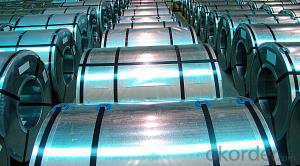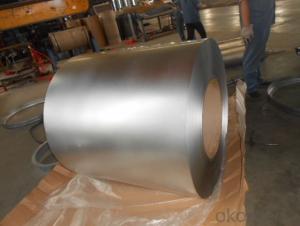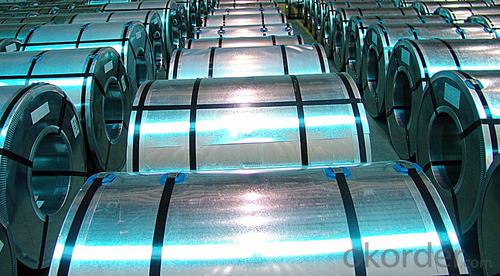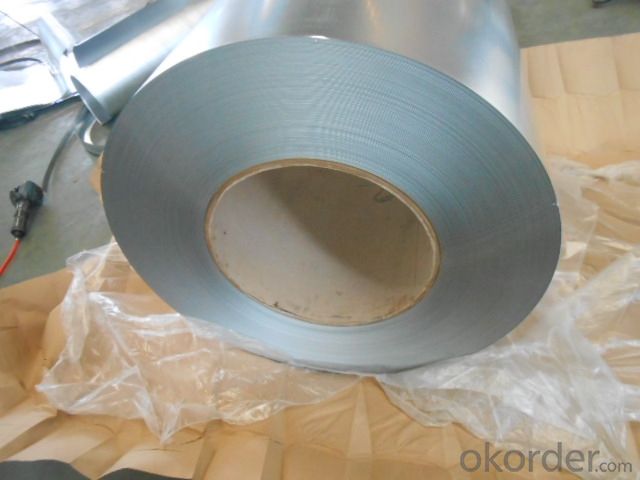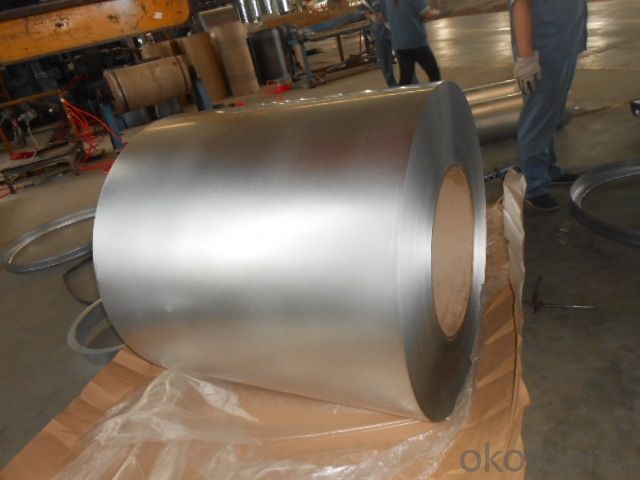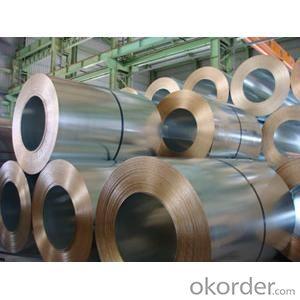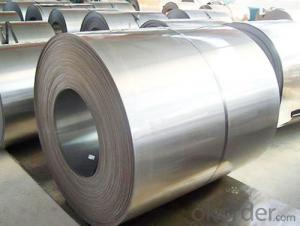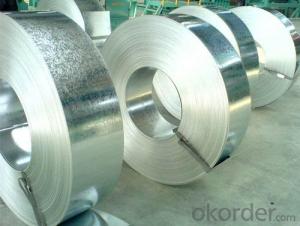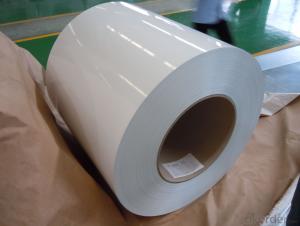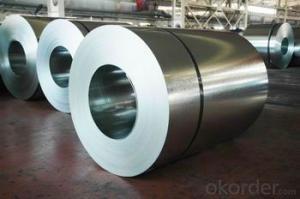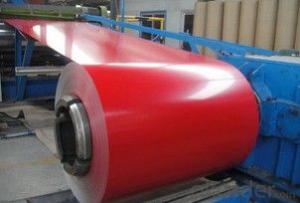High Quality Galvanized Steel in coil
- Loading Port:
- China Main Port
- Payment Terms:
- TT OR LC
- Min Order Qty:
- -
- Supply Capability:
- -
OKorder Service Pledge
OKorder Financial Service
You Might Also Like
Product Description:
Steel Specification:
Thickness: 0.2-3.0mm
Width: 600-1500mm
Coating Mass: Z08,Z12,Z18,Z20,Z22,Z25,Z27,Z35
Z80,Z120,Z180,Z200,Z220,Z250,Z275
Tolerance for thickness,width,flatness and so on conform to the requirements of JIS G3302 or ASTM A653M/924M
Coil ID can be either 508mm or 610mm, maximum coil OD is 2000mm
The speicfication of ASTM Such as A653m,A924 M and so on have been updated to the latest revisions
Application:
BUILDING & CONSTRUCTION
Floor decks, ceilings, verandas, rolling doors, warehouse, partitions, sheds, gutters, wall, underground piping, sashes, beams, fences, scaffolding, indoor decorations, ducts, ventilating pipes, steel frames and cable trays.
ELECTRICAL APPLIANCES
Freezers, video recorder cases, motor cases, lighting fittings, water heaters, washing machines, refrigerators, stoves, air conditioners, dehumidifiers, fluorescent light housings, electrical heaters, toasters, microwave oven enclosures and switch boxes.
TRANSPORTATION
Containers, under body panels, bus & truck body panels, fuel tanks, noise screens, highway signs, air cleaners, conveyor systems and guard rails.
AGRICULTURAL EQUIPMENT
Barns, drying machines, animal houses, hoppers, irrigation systems, greenhouses, water tanks, sheds, silos, agricultural implements and feeders.
FURNITURE & OTHERS
Vending machines, drums, cans, pails, sauna inner parts, chimney pipes, entertainment machines, solar collectors, office equipment, steel furniture, tool boxes, garages and waste bins.
COMPUTER'S APPLIANCES
Computer shells and communication instruments。
Surface Treatment:
Chromating treatment or anti-finger print
Surface Finished:
REGULAR SPANGLE:
Regular spangle is also called normal spangle which is naturally formed without any additional treatment during galvanizing.
MINI SPANGLE:
The spangle is restrained and formed as mini spangle by reducing the lead content in the zinc liquid or by blowing the zinc powder from the equipment installed on the zinc pot.
EXTRA SMOOTH:
The mini spangle is further skin-passed to produce the extra smooth surface.
- Q: im buying a new guitar,, it has a built in tuner and its semi acoustic (can be plugged into an amplifier) ,, im trying to choose which strings are better ,, steel or nylon..?
- You need to decide which type of strings you prefer BEFORE you select a guitar. Guitars are designed for one or the other types of string and they aren't interchangeable. If you try to put steel strings on a classical guitar. you'll ruin the guitar because it isn't built to withstand the extra tension that steel strings have. If you put nylon strings on a steel stringed guitar, the strings won't have enough tension to vibrate the top...resulting in low volume and horrible tone. To decide which type of guitar you need, ask yourself what genre of music you expect to be playing the most. Nylon stringed (classical) guitars have a rich full tone and are primarily for playing classical, flamenco, or folk music. Steel stringed guitars have a full but twangy tone and are primarily used for rock, pop, blues, and country music. You can play any genre of music on either style guitar, but it will sound more authentic if you match the music to the guitar. Best of luck to you, whichever style you choose.
- Q: I want to design and fab a steel helmet like that in the latest Batman cartoon movie. Only problem I can foresee is staining the metal red.
- How To Stain Steel
- Q: I bought a steel pendant on eBay, but it turned out to be too shiny.I've read on a couple forums that if I leave it soaked in urine for 2 days, it will get duller.Now, if it really does get duller, will the pendant get rusty afterwards?So is the shiny surface the only thing that prevents it from rusting?Any simple, non-urine ideas on how to make it duller are welcome too.Thanks!
- Stainless steel will rust under proper conditions. I live on a boat on salt water, trust me. If the urine works it won't be prone to rusting any more than before. It's not the shine that inhibits rusting with stainless steel, it the % of carbon in the steel, compared to regular steel. IF the urine works it's because it is acidic (a mild acid). Wash it with a small brush and some baking soda to neutralize the acid when your done. A much stronger acid would be swimming pool acid. (Muriatic acid) but be careful you might test a spot with a Q tip on the back. If you try Muriatic acid it would take seconds.Then wash in baking soda water to remove all acid.. SS
- Q: also what are the factors of location of these steel plants
- I work for a pipe manufacturer in Birmingham, AL. We have multiple divisions including two specialized steel pipe divisions and a ductile iron pipe divisions. As far as the steel pipe divisions, they purchase skelp from suppliers. All of the steel that they purchase is of domestic manufacture, and is very expensive. As for the ductile iron division, we manufacture our own iron for the pipe. To get the iron that we need, we buy scrap in the form of cars, refrigerators, rejected pipe that we produce, etc. It is shredded in one part of the plant, and then melted and cast as a new product. This has become very problematic, scrap prices have skyrocketed in the US due to the large demand from countries such as China who gobble all of the material because they need great quantities of it. So, to answer your question, we get steel from recycling and then some raw iron ore. As to where we get the raw ore, I'm not 100% sure.
- Q: What is the role of steel coils in the production of fencing materials?
- Steel coils play a crucial role in the production of fencing materials as they are used to create the wire mesh that forms the main structure of the fence. The coils are unraveled and fed into a machine which cuts and shapes the steel into the desired size and form. This wire mesh is then further processed and treated to enhance its strength and durability before being incorporated into the final fencing products.
- Q: Does anyone know if there is any info on Steel Manufacturing techniques, utilyzing electro/mechanical methods in order to create carbon nanotubes from the %C already inherant in the steel. In other words just modifying the Geometry of the Carbon the already makes up some of the steel.
- I don't think that would work. First off, there's not enough carbon in steel - even very high carbon steels are only about 2% carbon. Second, the iron atoms in steel form a crystal lattice, in the shape of a cube, with another iron atom in the middle of the cube. Each cube is about 0.3 nm per side. Carbon atoms work their way into the crystals and displace the iron atoms. But a carbon nanotube is around 1 nanometer in diameter - that's 3 times as big as the iron lattice! So a nanotube wouldn't fit. One thing you might do, however, is make a composite - mix the materials together on a scale a little bigger than the atomic scale that the iron and carbon mix to make steel. Just like a carbon fiber bicycle frame or ski pole is strands of carbon (much bigger and not as strong as nanotubes) held together with epoxy, you could hold nanotube strands together with metal. Not sure it would be good for armor, but if you can figure out a way to do it, I'm sure someone will come up with a use for it!
- Q: How do steel coils contribute to the water and wastewater industry?
- The water and wastewater industry heavily relies on steel coils as a crucial component for constructing and maintaining its infrastructure. These coils, made from high-quality steel, offer numerous advantages for the industry. To begin with, steel coils are essential in the production of pipes and tubes used primarily for transporting water and wastewater. Steel pipes are renowned for their exceptional strength and durability, enabling them to withstand high pressure and heavy loads. This makes them ideal for water distribution systems, sewage networks, and treatment plants. Steel coils provide the necessary material to manufacture these pipes, ensuring reliable and long-lasting infrastructure. Furthermore, steel coils are also utilized in constructing storage tanks and reservoirs. These tanks are vital for water treatment plants, serving as storage for large volumes of water or wastewater during the treatment process. Steel coils provide the required material for fabricating these tanks, guaranteeing their structural integrity and preventing leaks or contamination. Moreover, steel coils are used in manufacturing various equipment and components indispensable in the water and wastewater industry. For instance, steel coils are employed to produce pumps, valves, and control systems, which are crucial for the efficient operation of water treatment plants, pumping stations, and sewage networks. Steel's strength and corrosion resistance make it an ideal material for these applications, ensuring reliable and long-lasting equipment. Additionally, steel coils are also employed in constructing wastewater treatment plants and facilities. These plants employ various processes to eliminate contaminants from wastewater before discharging it into the environment. Steel coils provide the necessary material for constructing these facilities, including structural supports, tanks, and other components. The durability and resilience of steel ensure the longevity and efficiency of these treatment plants. In conclusion, steel coils play an integral role in the water and wastewater industry by contributing to the construction and maintenance of critical infrastructure. They are used in manufacturing pipes, tanks, equipment, and facilities, guaranteeing the strength, reliability, and durability required for the efficient operation of water and wastewater systems.
- Q: What are the different types of steel coil packaging systems?
- There are several types of steel coil packaging systems available, including horizontal coil packaging machines, vertical coil packaging machines, and coil wrapping machines. Each system is designed to securely package steel coils for transportation and storage, ensuring their protection from damage and corrosion.
- Q: I wrote in my assignment that mild steel has a high carbon content (4%).This is why it has its strong and rigid properties.. is this correct?
- Bazza is heading in the right route yet time fogs the remember for us all. cut back small try samples off the inventory bar say pound coin thickness. warmth cherry purple and quick quench in water. The intense carbon metallic will be hardened so puzzling to scratch even as gentle scratches genuinely utilising a drill element or hacksaw blade. That warmth treatment will go away the metallic in its toughest maximum brittle state so will carry an edge yet snap like a carrot. So having hardened your merchandise it can be tempered to get rid of a few hardness and presented toughness. So the compromise is difficult adequate to carry the edge yet difficult adequate to deflect sensibly without fracture. Swot up on mood colors/warmth treatment and practice on scrap. an exciting litte exercising i have used with apprentices contained in the previous is to take an old document and anneal (melt) it so it drills or takes a said cut back genuinely then re harden it so it files back. The tang will be got here upon harder than the blade though it is the same metallic. note the tang will be bent without snapping. For practice you are able to harden the tang so it snaps common. in simple terms by how scrap chilly chisels, drill bits, files etc are in simple terms the metallic you want and recycleable by forging and warm temperature teatment. i think a Samurai second drawing close!!!!! sturdy success
- Q: A 100 kg solid steel ball with a radius of 5 m is being spun on ice with an angular velocity of 5 rev/s pointed into the ice (clockwise rotation when viewed from above).A student shoots a 10 kg marble at the steel ball. The marble hits the ball along its side as shown with an initial velocity of 5 m/s to the left. If, right after the collision, the final velocity of the marble is 2.5 m/s to the left, what is the angular velocity of the steel ball after the collision?
- You need to do conservation of angular momentum about the steel ball's axis. Angular momentum = I.ω The steel ball's initial ω = 5 rev/s = 5*2pi rad/s = 31.4 rad/s The steel ball's moment of inertia I = (2/5)*m*r^2 = 40*25 kg.m^2 = 1000 kg.m^2 The marble's initial ω = v / r where r is the perpendicular distance from the steel ball's axis You need to look at the diagram for this. The marble's I about the steel ball's axis is I = m*r^2 where r is the same as above. (marble is treated as a point mass). Then work out the total initial ang. momentum = final ang. momentum and solve for ω...
Send your message to us
High Quality Galvanized Steel in coil
- Loading Port:
- China Main Port
- Payment Terms:
- TT OR LC
- Min Order Qty:
- -
- Supply Capability:
- -
OKorder Service Pledge
OKorder Financial Service
Similar products
Hot products
Hot Searches
Related keywords
